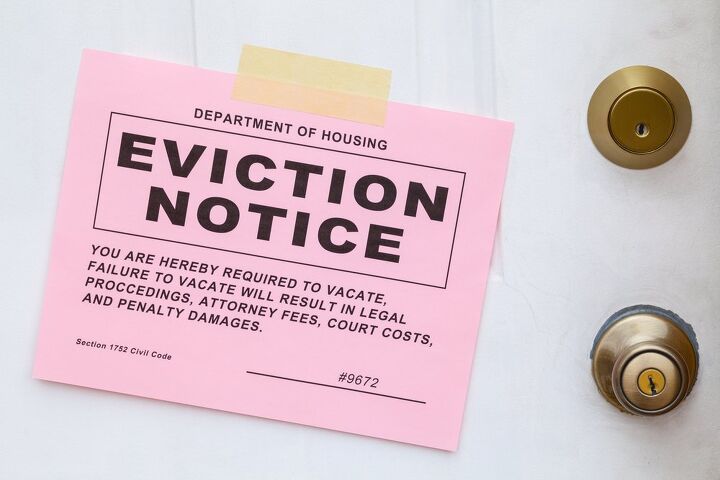How Long Does It Take To Evict A Tenant In Illinois?

When you’re a landlord, you make an effort to try to find tenants that will be respectful towards your property and pay on time. However, things don’t work out, even when you do your best to vet potential renters. Renters and landlords both have rights that need to be protected. That’s why Illinois has strict guidelines on how to evict a tenant in Illinois legally.
It takes an average of 10 weeks to evict a tenant in Illinois. Tenants receive a 60-day eviction notice, but the notice can be as short as 5 days due to failure to pay rent. Court dates, tenant defense, and how long it takes to receive the notice affect how long the process takes.
Knowing what to expect in terms of timeframe is essential with an eviction, especially if you are worried about having to plan out repairs to your apartment. This guide will give you the information you need.
How Long Does It Take To Evict A Tenant In Illinois?
Tenant evictions usually take around 10 weeks to be fully enacted, but your specific timeframe can vary depending on a wide range of factors.
These include:
- Tenant Defenses. If your tenant has ample evidence that leads to a plausible defense for an eviction, your court date can last longer.
- Notice Dates. Illinois law dictates that the notice to evict can be given within 10 days if the tenant breaches the contract. However, if the tenant isn’t at fault and has an annual lease, you may need to give them as long as six months.
- Court Dates. Clogged courts can cause delays in evictions. There has been a severe backlog throughout most of Illinois’s courts as a result of current events.
- Judgment Stays. If your tenant has been given judgment for possession, the official eviction process has finished. Though it’s possible to have an immediate judgment following a court date, most courts will provide a two to three-week stay (freeze) before the tenant is forced out.
Can You Ask Your Tenant To Leave Without An Eviction Notice?
Absolutely. Most landlords never want to have to go through a legal process if they can avoid it. The same can be said for tenants since they know that an eviction record can cause serious difficulties in finding a new tenancy.
If you want to approach your tenant and ask them to leave, by all means, do. However, it’s important to note that you cannot try to force them out by changing their locks, throwing out their goods, or making the apartment inhospitable. This is considered to be an illegal eviction and is punishable by law.
What Are The Fastest Ways To Get The Tenant Evicted?
The first and most crucial step to the eviction process is terminating the tenancy. This is called giving them a notice of eviction, and it often is one of the more substantial parts of the eviction process in terms of timeframes.
Illinois is unique in handling evictions, primarily because fault and cause for eviction play heavily into the timeframes that eviction can happen.
There are four main notice timeframes in Illinois law, all based on the cause:
- The most extended eviction processes are reserved for tenants that have annual contracts that are not at fault for the eviction. The minimum notice for eviction period that landlords need to do is 60 days; however, it can take up to six months in some cases.
- Tenants that are on a month-to-month rental basis can be given a minimum of 30 days, assuming they’re not at fault. Some courts may ask for a slightly longer time, depending on local laws. Week-to-week renters are given only seven days’ warning time.
- Tenants who are found guilty of a contract breach are given 10 days’ notice. A contract breach (such as subletting in a no-subletting apartment) is deemed a valid reason to short notice to 10 days.
- Failure to pay rent is a five-day notice. Did your tenant bail on paying rent? If so, then you are allowed to give them a five-day notice.
Special Eviction Cases: Timeframes For Notices
Though the “main four” constitute the majority of Illinois evictions, there are some exceptional cases that can also lead to expedited or unique timeframes. These include
- Illegal Activity. If criminal activity or illicit drug use occurred at the apartment, then the police will most likely be involved. Apartment owners have the right to evict people after seven days’ of given notice.
- If there’s no lease showing the relationship between the squatter and the landlord, it may be hard to get an official eviction underway. Since this is an extreme and rare circumstance, eviction lawyers are usually involved, and it can be challenging to get a timeframe on courts.
- At-Will Tenancy. If you are doing a day-to-day tenancy, then you don’t have a set timeframe that you need to abide by. As long as you give them written notice, you can move forward with the eviction.
Does The Notice Mean That Your Tenant Is Evicted?
Not quite. Issuing out the notice means that you’ve given your tenant time to find a new apartment. If they choose to continue to stay there after the notice expires, you are given the green light to start the eviction process.
From there, you will have to file a complaint and schedule a court date. If the eviction is granted, a writ of execution is posted, and the property is returned to the landlord.
How Long Does A Court Hearing Take?
Illinois has been suffering from a backlog of court dates, so it can take anywhere from three to four weeks to get a hearing. From there, you will have to explain your case to the judge, who will issue a judgment.
If tenants disagree with the decision, they have the right to ask the judge to vacate the default judgment. They’re given 30 days from the hearing’s date to file this appeal. If the judge still stays by the initial decision, then residents will be legally forced out.
Is There Anything That Can Be Done To Speed Up An Eviction?
Unfortunately, there isn’t. Eviction processes have to be followed to the letter, and the courts are already stressed as they are. There are no special appeals to speed up the eviction process, so acting as soon as you can is the best tactic you should attempt.
Of course, an ounce of prevention is worth a pound of cure. Most landlords can get bad tenants to leave faster by merely asking them to go. Using tact and offering to give them more time than a notice would allow usually works in simple situations.
The Step-By-Step Process To Evict In Illinois
If you’re stuck in a situation where you need to know how to evict a tenant in Illinois, we’ve got you covered.
Step 1: Is Eviction The Right Decision?
First, figure out whether eviction is necessary. For instance, if a lease ended and the tenants refuse to vacate, that is grounds for eviction. Or if they have an animal when they’re not in the lease, that’s also grounds for eviction. However, if they’re having severe financial issues due to a severe illness in the family, perhaps there’s something else you can do.
Step 2: Speak With Your Tenant
It’s best to attempt to resolve issues without involving the courts. Take the time to discuss with your tenant to see why they broke the agreements in the lease or why they’re behind on their rent. Maybe they have an extenuating circumstance that you need to know about.
Take the time to explain how they violated the terms of their lease. If you reach a resolution by talking with them, make sure you get it in writing with notarized signatures.
Step 3: Send An Official Letter
Sending an official letter is a great idea, even after you’ve already talked to them. This way, you have it all in writing, and you set your clear expectations. Let them know that you expect them to follow the terms of the lease very strictly. Include examples that relate to them, of ways that they are violating the terms of the lease.
This should be an official letter. That way, if everything does escalate and you find yourself in court, then you can mention that this was sent. In court, you need proof that you’ve given the tenant a fair chance. The letter is part of that fair chance. However, if this doesn’t work, then you will need to draft an eviction notice formally.
Step 4: Write A Draft Of The Eviction Notice
The next step you will need to take is drafting the eviction notice. You will need to include the property address and the unit number. You will also need to have the amount of rent that is due at the time you serve the notice.
In Illinois, there are three types of eviction notices that you can give. These three types are:
- 5-day notice. This notice is only for refusing to pay rent. The tenant will have 5 days to pay or the option to vacate.
- 10-day notice. A 10-day notice is for anyone breaking the lease terms by either having animals when they aren’t supposed to or participating in illegal activities. Most individuals under this notice don’t get a second chance. They have 10 days to leave the property.
- 30-day notice. If there is another reason why they need to move, such as selling the property or any other reason, you will need a 30-day notice. You can use the 30-day notice to evict a tenant for any reason.
Step 5: Deliver The Eviction Notice
After you’ve written the notice, you will need to deliver it to the tenant. There are two ways that you can do this:
- Hand deliver the letter
- Send the letter by certified mail and request a return receipt
When you hand-deliver, sometimes tenants refuse to accept the letter. In this case, you will need to either leave it on the ground in front of them, or you can tape it to their door in instances where they refuse to answer.
After delivering the notice to them, you will need to file an affidavit of service and notarize it. This is to say that you officially gave them the eviction notice. Of course, if they still don’t budge, you will need to file a hearing in court. Check with your local authorities on how to do that correctly.
Our Final Take
Eviction is never a speedy issue, primarily because this legal proceeding can put peoples’ shelter security in danger. In Illinois, a legal eviction process usually takes about 10 weeks to enforce fully—,, but it can take as long as six months in some cases.
If you want to shorten your tenant’s move-out date, the best way to do so is to ask them if they’d leave. In many situations, tenants will agree to do so in order to avoid an eviction on their records.

We are a team of passionate homeowners, home improvement pros, and DIY enthusiasts who enjoy sharing home improvement, housekeeping, decorating, and more with other homeowners! Whether you're looking for a step-by-step guide on fixing an appliance or the cost of installing a fence, we've here to help.
More by Upgraded Home Team











![Finishing Basement Without Permit [Is It Really Illegal?]](https://cdn-fastly.upgradedhome.com/media/2023/07/31/9070078/finishing-basement-without-permit-is-it-really-illegal.jpg?size=350x220)















